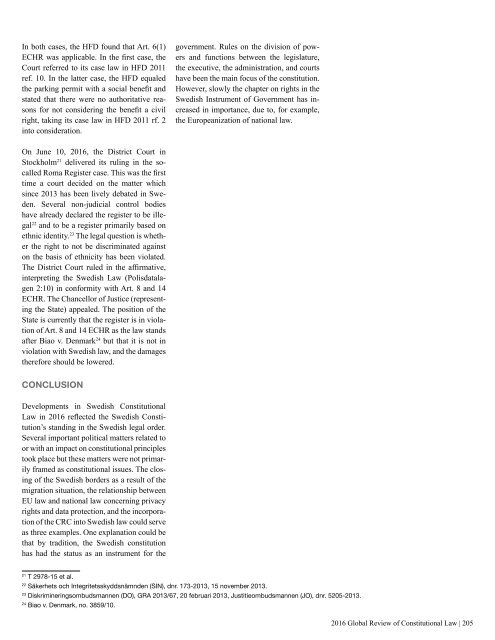2016 Global Review of Constitutional Law
I-CONnect–Clough Center collaboration.
I-CONnect–Clough Center collaboration.
You also want an ePaper? Increase the reach of your titles
YUMPU automatically turns print PDFs into web optimized ePapers that Google loves.
In both cases, the HFD found that Art. 6(1)<br />
ECHR was applicable. In the first case, the<br />
Court referred to its case law in HFD 2011<br />
ref. 10. In the latter case, the HFD equaled<br />
the parking permit with a social benefit and<br />
stated that there were no authoritative reasons<br />
for not considering the benefit a civil<br />
right, taking its case law in HFD 2011 rf. 2<br />
into consideration.<br />
government. Rules on the division <strong>of</strong> powers<br />
and functions between the legislature,<br />
the executive, the administration, and courts<br />
have been the main focus <strong>of</strong> the constitution.<br />
However, slowly the chapter on rights in the<br />
Swedish Instrument <strong>of</strong> Government has increased<br />
in importance, due to, for example,<br />
the Europeanization <strong>of</strong> national law.<br />
On June 10, <strong>2016</strong>, the District Court in<br />
Stockholm 21 delivered its ruling in the socalled<br />
Roma Register case. This was the first<br />
time a court decided on the matter which<br />
since 2013 has been lively debated in Sweden.<br />
Several non-judicial control bodies<br />
have already declared the register to be illegal<br />
22 and to be a register primarily based on<br />
ethnic identity. 23 The legal question is whether<br />
the right to not be discriminated against<br />
on the basis <strong>of</strong> ethnicity has been violated.<br />
The District Court ruled in the affirmative,<br />
interpreting the Swedish <strong>Law</strong> (Polisdatalagen<br />
2:10) in conformity with Art. 8 and 14<br />
ECHR. The Chancellor <strong>of</strong> Justice (representing<br />
the State) appealed. The position <strong>of</strong> the<br />
State is currently that the register is in violation<br />
<strong>of</strong> Art. 8 and 14 ECHR as the law stands<br />
after Biao v. Denmark 24 but that it is not in<br />
violation with Swedish law, and the damages<br />
therefore should be lowered.<br />
CONCLUSION<br />
Developments in Swedish <strong>Constitutional</strong><br />
<strong>Law</strong> in <strong>2016</strong> reflected the Swedish Constitution’s<br />
standing in the Swedish legal order.<br />
Several important political matters related to<br />
or with an impact on constitutional principles<br />
took place but these matters were not primarily<br />
framed as constitutional issues. The closing<br />
<strong>of</strong> the Swedish borders as a result <strong>of</strong> the<br />
migration situation, the relationship between<br />
EU law and national law concerning privacy<br />
rights and data protection, and the incorporation<br />
<strong>of</strong> the CRC into Swedish law could serve<br />
as three examples. One explanation could be<br />
that by tradition, the Swedish constitution<br />
has had the status as an instrument for the<br />
21<br />
T 2978-15 et al.<br />
22<br />
Säkerhets och Integritetsskyddsnämnden (SIN), dnr. 173-2013, 15 november 2013.<br />
23<br />
Diskrimineringsombudsmannen (DO), GRA 2013/67, 20 februari 2013, Justitieombudsmannen (JO), dnr. 5205-2013.<br />
24<br />
Biao v. Denmark, no. 3859/10.<br />
<strong>2016</strong> <strong>Global</strong> <strong>Review</strong> <strong>of</strong> <strong>Constitutional</strong> <strong>Law</strong> | 205


